By Chris Casey | University Communications
AURORA, Colo. (May 23, 2014)—The skies cleared Friday morning, bathing the Anschutz Medical Campus in bright sunshine after days of drenching rains and swirling winds. It couldn't have been a more perfect setting for the commencement ceremonies that saw more than 865 students walk to the podium for their degrees.
The School of Medicine ceremony brimmed with poignant moments as longtime Dean Dr. Richard Krugman, M.D., who recently announced he will be stepping down as dean, delivered a touching and thought-provoking address. Also, one of the class's standout leaders, Igor Shumskiy, was greeted by four generations of his family, including his physician grandmother, who hooded him.
Here are profiles of just a few of our many talented graduates:
IGOR SHUMSKIY: Keeping up a family tradition in health care
Practicing medicine goes back generations in the Shumskiy family, extending into Eastern Europe in the 1940s. At the University of Colorado School of Medicine Commencement, the circle became complete when Igor Shumskiy was hooded by his grandmother, Nella.
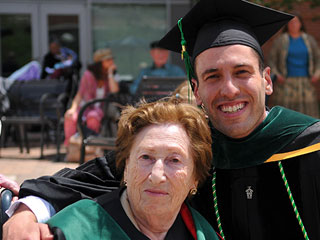 The odds of Nella Ravdel entering medical school in Ukraine some 70 years ago were not good. With the outbreak of World War II, the Shumskiys fled their home country to Siberia. They returned in 1945, and although heath-care training wasn’t a certainty for the family as religious persecution mostly barred the Jewish community from medical schools, the lack of males in the immediate post-war era opened the doors for her.
The odds of Nella Ravdel entering medical school in Ukraine some 70 years ago were not good. With the outbreak of World War II, the Shumskiys fled their home country to Siberia. They returned in 1945, and although heath-care training wasn’t a certainty for the family as religious persecution mostly barred the Jewish community from medical schools, the lack of males in the immediate post-war era opened the doors for her.
Nella’s father was a renowned inventor of medical equipment in Ukraine and pushed her toward medicine. She attended school in Dnipropetrovsk and graduated in 1950. She started out in family practice, which surprised many of her professors because they noted her skills in working with children.
“Even when I was a child it was very obvious she was extremely good with kids,” Igor said. “They felt very comfortable with her and she understood them.”
The family—including Nella and her husband, Anatoliy—moved to Colorado in 1991 when Igor was 4. Under his grandmother's guidance, Igor grew up aspiring to become a physician.
“She was always a big influence in my life in terms of medicine and caring for children,” he said. “That was always a big motivation for me to go to medical school and become a pediatrician.”
He earned a bachelor’s degree in biochemistry and mathematics at CU-Boulder and enrolled at the CU School of Medicine with plans of practicing emergency medicine. “Over time, I realized that didn’t fit my skills or interests,” Igor said. “It became pretty clear during my pediatrics rotation. I was much happier and more content with what I was doing. I came home pleased with my day and was excited to go to work.”
On Match Day, Igor was matched with his first choice, Boston Children’s Hospital. He’ll join the hospital’s urban health and advocacy track. “I got pretty lucky,” he said.
On Friday (May 23), Igor’s family—parents, sister, two nieces and grandparents—watched another pediatrician enter the family. As class speaker at the graduation ceremony, Igor delivered a compelling speech about the complexities and opportunities that await his fellow graduates in the field of medicine. As he spoke holding the microphone, he occasionally paused to solve a Rubik's Cube that he held in his other hand. At the end of his talk, he held the solved cube aloft and said, "We chose to do the simplest, most beautiful act. We've chosen to help people."
Prior to the ceremony Igor reflected on the Class of 2014, which he called a "phenomenal" group of students. “We’re going to go on to do some pretty amazing things—if we’re not already doing them,” he said.
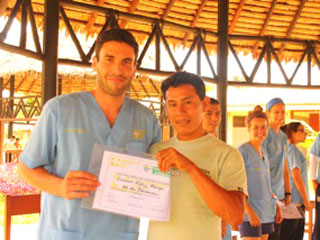 One of the memorable things Igor has done is serve for the past year as president of CU Peru, a nonprofit that educates community health workers in the Peruvian Amazon. During the past four years, Igor has spent a total of about five months in Peru working on health projects. “I have a lot of experience with community development in Peru and international nonprofit work,” he said. “I’m hoping I can intertwine that and work on better systems of medical care, especially with pediatrics.”
One of the memorable things Igor has done is serve for the past year as president of CU Peru, a nonprofit that educates community health workers in the Peruvian Amazon. During the past four years, Igor has spent a total of about five months in Peru working on health projects. “I have a lot of experience with community development in Peru and international nonprofit work,” he said. “I’m hoping I can intertwine that and work on better systems of medical care, especially with pediatrics.”
He has also worked to create a better sense of community among School of Medicine students, residents and faculty, as one of two Lead Student Advisors in the Advisory College Program, an 18-month-old advising and wellness program for SOM students.
The Advisory College Program, a joint effort with the Office of Student Affairs, is broken into eight “colleges” comprising problem-based learning groups. The Spring Stampede caps each academic year with field day-style events on the quad at the Anschutz Medical Campus.
The hope is that the Advisory College Program, which improves opportunities for cross-class collaboration and mentorship, will be integrated with the medical school curriculum. “It’s a very innovative program and we’re hoping it continues to grow and provide new opportunities for our students,” Igor said.
He is also interested in improving education for medical students. “I want to help keep them excited and engaged and keep them loving what we do,” Igor said. “It’s easy for us to forget why we’re doing what we’re doing, or why we went into this in the first place.”
NOELLE DILGARDE: From rural Africa to advanced degrees in health care
As a young girl in Cameroon, Noelle Djongoue Dilgarde often dreamed about becoming a nurse. She lived in the city with her family, but summers were spent in the village where her grandfather lived.
"I come from a family of traditional practitioners," Dilgarde said. "My grandfather and mom used herbs to treat people in the village—what we call here natural medicine from plants."
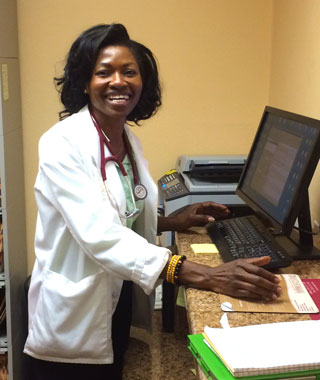 In 2003, Dilgarde moved to the United States to pursue her dream of earning a university degree and working in health care. Knowing no English, she enrolled in English-as-a-second-language classes in Chicago. She soon met her future husband, who was from Colorado, and her future began to fall in place when she started an undergraduate registered nursing program in Denver.
In 2003, Dilgarde moved to the United States to pursue her dream of earning a university degree and working in health care. Knowing no English, she enrolled in English-as-a-second-language classes in Chicago. She soon met her future husband, who was from Colorado, and her future began to fall in place when she started an undergraduate registered nursing program in Denver.
But then her husband fell ill. He had a series of surgeries, including liver and sigmoid colon operations, before suffering from significant complications, including a bout with listeria. "I did that entire RN program with my husband in and out of the hospital—now I'm doing my master's program with my mom in and out of the hospital."
This spring Dilgarde graduated with a master of science in nursing from the University of Colorado College of Nursing, with an emphasis as a family nurse practitioner.
Her mother has been battling heart problems and between classes, and often overnight, Dilgarde has been at her bedside at University of Colorado Hospital. "I just love to take care of people," she said. "Even as a little girl I just loved that. Nursing gives you that opportunity to be one-on-one with a patient and you get to see the progress of your work. It's rewarding when that person gets better."
Over the past several years, Dilgarde has frequently felt overwhelmed. But, she says, "you have to find a way to laugh about the situation. You can't just sit there and cry and say, 'I can't do this.'"
Dilgarde is currently doing two clinicals—at Dermatology Associates of Colorado in Lone Tree and Romanat Clinic in Aurora—and her story of perseverance especially serves as an inspiration to her patients at Romanat. The clinic treats an underserved population: immigrants, Medicaid patients, the poor.
She said patients often gaze at her wide-eyed when they see her in her white coat. "Every day I tell my story to young patients who ask questions: Is it hard to learn English? Go to school? I tell them at the start it was. When I first met my husband we communicated in sign language.
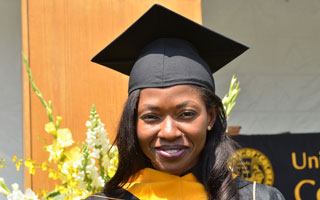 "My intention is to just push these young girls and boys who come to the clinic with this message: 'Hey, you can do this.'"
"My intention is to just push these young girls and boys who come to the clinic with this message: 'Hey, you can do this.'"
The physician at the clinic, Dr. Haftu Gebrehiwot, MD, is glad to have Dilgarde on the team. "Our patients have responded to her," he said. "This means she's good."
Dilgarde, who is also raising a 15-year-old daughter, has still more degrees—and lofty ambitions—in her future. This fall she will start her doctorate of nursing program at the CU College of Nursing; concurrently, she will pursue her second master's degree—a master of public health in the Colorado School of Public Health.
Ultimately, Dilgarde, who speaks French, English, Bantu and Spanish, wants to move from one-to-one patient care to serving larger populations. "I want to come up with something—design a health-care program—and see how it applies to a whole organization or a village. I would also love to work with an international organization, like UNICEF, because I don't want to waste the language skills I have."
This summer, she plans to volunteer for International Medical Relief on a trip to Kenya.
Having grown up poor in Africa, not a day passes when Dilgarde isn't grateful for the opportunities she has found in the United States and at CU Anschutz. "I dreamt of one day going to university and having a degree, and being able to work in the medical field," she said. "This is a dream that, as a little girl, you have in the back of your mind and you never imagine that you'd be in such a program."
LEVI BONNELL: Inspired to improve global public health
Levi Bonnell finds inspiration on foreign soil, especially in countries that are struggling to improve public health.
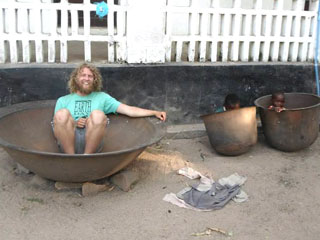 So when Bonnell spoke to the Class of 2014 at the Colorado School of Public Health's commencement ceremony, he shared snippets from his adventures in Guatemala, Asia and sub-Sahara Africa.
So when Bonnell spoke to the Class of 2014 at the Colorado School of Public Health's commencement ceremony, he shared snippets from his adventures in Guatemala, Asia and sub-Sahara Africa.
The path to his Master's in Public Health (MPH), a 4.0 GPA and the speaker's podium started inauspiciously. Back in his early undergraduate days at CU-Boulder, Bonnell lacked focus, landed on academic probation and then flunked out. He'd always enjoyed traveling and exploring other cultures, so the summer after his freshman year he went to Guatemala to help build an orphanage.
"The trip changed my life. It gave me a lot of perspective," Bonnell said. "It inspired this lifelong love of travel and helping people who are less fortunate."
Bonnell turned his academics around and earned a bachelor's degree in quantitative economics with a minor in applied mathematics. He then spent a year studying methodology in the Engineering Management Program at CU-Boulder.
"That got me interested in epidemiology and biostatistics. I thought I could apply this knowledge to helping people—so that's where the idea of getting a master's in public health came in," he said. "Also, I was a teaching assistant in that program, and it ignited a passion for teaching as well."
Before he entered the master's program at the Colorado School of Public Health, Bonnell traveled to Asia and bought a motorcycle. He spent six months riding around Vietnam, Laos and Cambodia. "I planned to get off the beaten path, to look at it as a way to find inspiration, but it was really eye-opening and also a ton of fun," he said of the adventure.
Not speaking the languages, Bonnell found his way into the homes of villagers and monks by smiling, using hand gestures and pulling out his maps. "It was amazing how people with nothing can offer everything," he said.
While touring Southeast Asia he logged onto a computer just long enough to finalize his enrollment into the MPH program at the school's Anschutz Medical Campus location.
Also fun and inspiring has been his experience with the "fantastic professors" at the Colorado School of Public Health. Bonnell has especially been influenced by Jessica Bondy, MSHA; Deborah Thomas, Ph.D.; John Hokanson, MPH, Ph.D.; and Sharon Lutz, Ph.D.
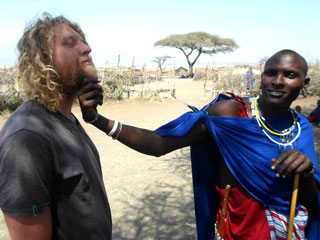 "They are so cool and so willing to help," Bonnell said. "We have these ski days where a lot of professors come. They are experts—some of them are the best in the world in their field—and they like to come hang out with us."
"They are so cool and so willing to help," Bonnell said. "We have these ski days where a lot of professors come. They are experts—some of them are the best in the world in their field—and they like to come hang out with us."
He enjoys how professors from other schools and colleges on the Anschutz Medical Campus also contribute to his academic experience. "It's a nice mix. You get a lot of different viewpoints."
Bonnell has also benefited from Associate Professor Thomas's six-year association with the Catholic University of Health and Allied Sciences (CUHAS) in Tanzania. Last summer, Bonnell joined Thomas on a trip to the East African nation to continue the collaborative work between the Colorado School of Public Health and CUHAS on public health projects. They worked on a project that involved artisanal gold miners who'd been exposed to mercury and arsenic. Their research also focused on knowledge, awareness and attitudes about rabies in rural areas. "The mining towns just pop up out of nowhere," Bonnell said. "They have no infrastructure, no running water. The rates of STDs are incredibly high."
This spring, Bonnell completed his capstone project which involved data analysis from Tanzania. The goal is to upgrade sanitation in northwestern Tanzania.
Bonnell enjoys using GIS mapping to improve global health. Statistical data presented on maps, for example, can show villagers their proximity to health clinics. "It's a literal and visual representation of data analysis," he said. "I think it's a really easy way to convey ideas to people who, otherwise, may not fully understand because of language or cultural barriers. It's a framework to communication."
He recently communicated to the masses when he was featured in an "extreme makeover" segment on Fox 31's "Everyday" program. A friend's father owns a local business, Montana Salon, so Bonnell, who at the time had long hair and scruffy beard, sat in the chair and transformed into a clean-cut, bowtie-wearing graduate student. The segment includes Bonnell talking up his university and Tanzania experiences.
Now he's setting his sights on the next experience, which will undoubtedly include more overseas travel. "My five-year plan is to find a specific passion and pursue a Ph.D.," Bonnell said. "I'm trying to find that particular passion, because everything is so interesting at the moment."
FRANK HALL: Serving the rural corners of Colorado
Between his junior and senior years of high school, Frank Hall traveled from his small hometown of Akron, Colo., to Aurora to participate in the Colorado Rural Health Scholars Program (CoRHSP) at the University of Colorado School of Medicine.
The experience changed his life.
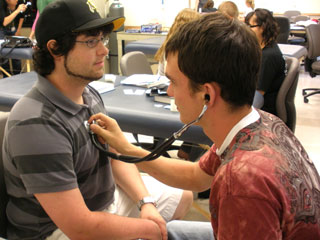 “We volunteered at different hospitals in the area and shadowed doctors and nurses,” said Hall (wearing hat in photo). “It just exposed us rural high school students to all the different types of health care fields … I found it really interesting. That’s what got me into medicine.”
“We volunteered at different hospitals in the area and shadowed doctors and nurses,” said Hall (wearing hat in photo). “It just exposed us rural high school students to all the different types of health care fields … I found it really interesting. That’s what got me into medicine.”
During his first year of medical school at CU, he joined the Rural Track. He also volunteered to run the CoRHSP the following summer. Hall, who will do his residency at the University of Colorado Hospital, plans to go into internal medicine and ultimately specialize in oncology.
Small communities are underserved for local check-up care, he said. "I would like to go to small towns two to four times a month, depending on the need of the area, just so patients don't have to go all the way to Denver to get their follow-up exams."
Hall spent two years during medical school serving as a "big brother" in Big Brothers Big Sisters of Colorado. Enjoying the role of mentor, Hall hopes to integrate teaching into his future medical career. "I like exposing people to new things and showing them their potential," he said. "You don't really know what your potential may be in health care if you don't know what the field is like and if you don't know what different practitioners do."
Hall, who earned his bachelor's degree in integrative physiology at CU-Boulder, hopes to be able to give back to the northeastern Colorado community where he was raised and where his mother has been a nurse for 30 years.
"It's the area I know," he said. "When I think about going to a rural community I know it's definitely the northeast plains."
Published: May 23, 2014
Contact:christopher.casey@ucdenver.edu
